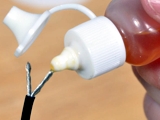|
|
|
|
||||||||
Has My Flux Expired?
Board Talk
|
||||||||
TranscriptPhil Welcome to Board Talk with Phil Zarrow and Jim Hall of ITM Consulting. We're the Assembly Brothers. Today we are coming to you from the elegante ballroom high atop Mount Rialto. Where the air is thin, and everything else is too. We're here to talk about electronic assembly, materials, equipment, components, practices and procedures. Who knows what else. So Jim, what else? What kind of question do we have today? Jim Well, this comes from P.H. A very caustic question. Phil You have a very acidic tongue to say that. Jim Trying to keep up with my brother. Beyond the printed expiration date, what other criteria are used to judge whether a flux is expired or contaminated? What specific attributes occur in an expired flux? How do you know if a flux is bad and shouldn't be used? Are there any simple tests one can do to test fluxes? Phil You better go first on this, because we are talking about PH here. And I am not talking about the person. I am talking about what I might say. So go ahead Jim. Jim Well certainly, always respect the expiration date on any material you buy. My general feeling is, if you have any question don't use it. We are talking about creating electronics. We are talking about making the solder interconnections, which are very critical. Lots of things can go wrong as people will point out. Flux is one of the three things you need to make a solder joint. You need heat, metal and flux. Don't take any chances. If it is expired, don't use it. Other attributes, I even hate to say it. Well, one thing we know that can happen with flux is the solvent can evaporate. You would typically see an increase in viscosity. Maybe a change in color, change in aroma. I don't know. Simple tests? I don't know simple. You can certainly do wetting tests, wetting balance, copper mirror. Things like that. The standard tests they use to qualify fluxes. I don't know how simple you perceive them as. Wetting balance of course would be the best. That is what its basic job is to do, is to promote wetting, clean the outsides. Other than that, keep your fluxes from getting contaminated. Keep them covered so that they can't evaporate. Keep them in properly sealed containers so that contamination can't get into it. I can imagine that there are things that can go undetected until you get bad soldering and poor quality solder joints, and all the other things resulting from degraded properties of your flux. Phil Well, I think the bottom line is, as you said in the first place Jim, follow the expiration date. There is a reason the flux manufacturers put it on there. They know their chemistry. They tested it extensively. They're not putting it on there "Let's put it up a few months earlier so that we can con these bozos into buying more flux." You know, it is not an evil conspiracy here. On the other hand, I have heard of people selling their flux to third world countries. Geez, just go by the expiration date. The only other thing I'll add, hey P.H. clean out your refrigerator and clean out you medicine cabinet too. Expired flux. Alright, enough said on that. I hope we made the point. Yes, you've been listening to Board Talk and just remember if you can't laugh at yourself we certainly will. And whatever you do, however badly expired your flux is, please don't solder like my brother. Jim And don't solder like my brother. |
||||||||
Comments
|
||||||||
|
|

|




